Professor Sinan Laçiner from Cumhuriyet University (Turkey) will give lecture „Comparative Media Systems: Turkey and Lithuania“ at Kazimieras Simonavicius University on 15 September (Friday). Lecture will start at 1.45 p.m. in room no. 212.
The professor will present theoretical models of comparative media systems, contemporary media problems in various countries, emphasizing Turkey and Lithuania.
Future journalists are especially invited to this lecture, but other students are also very welcome as the lecture is open.
Language of instruction – English.
10 Kazimieras Simonavičius University students can participate in the Intensive Course “Organisation and Individual Security” for free. The course will take place in Turiba University (Latvia) on August 14-25th.
About the course:
In recent years security issues has become important also to Baltic and Nordic countries. World is coping such challenges as migration, conflicts based on different cultural backgrounds, cyber-attacks and other new challenges. This leads to fact that there is need for high quality training for young security specialists. Those specialists need knowledge and skills not only in subjects traditionally known as necessary for Security specialist, but also be able to manage the team and stress situations, be good intercultural communication specialist and cope with cyber-security challenges.
The course comprises theoretical programme, seminars as well as a set of interesting intensive practical lessons. During the two week course students will gain also practical knowledge in person’s and organisation’s security. Student will gain knowledge of assessment of security tactics for guarded sites, basics of tactical planning and implementation methods for threat prevention and their legal regulation; comprehensive knowledge of facts, theory and correlations necessary for carrying out work related tasks, personal growth and development, public participation and social integration.
Main topics of the course:
3 ECTS credits will be awarded for the completed course. Organizers will cover the project travel costs (bus tickets for Lithuanian students), pick-up service, accommodation, also catering, study visits, some free time activities. Course will be in English, so students must have knowledge of English.
If you want to participate, please fill in the application form and send it to KSU International Coordinator Vaiva Poškaitė-Tomaševič (international@ksu.lt) until June 21 .
More information: ABOUT NORDPLUS Intensive Course
Application form: APPLICATION FORM FOR STUDENTS
Partners:
Turiba University, Latvia
Kazimieras Simonavicius University
Turku School of Economics – BRDC, Finland
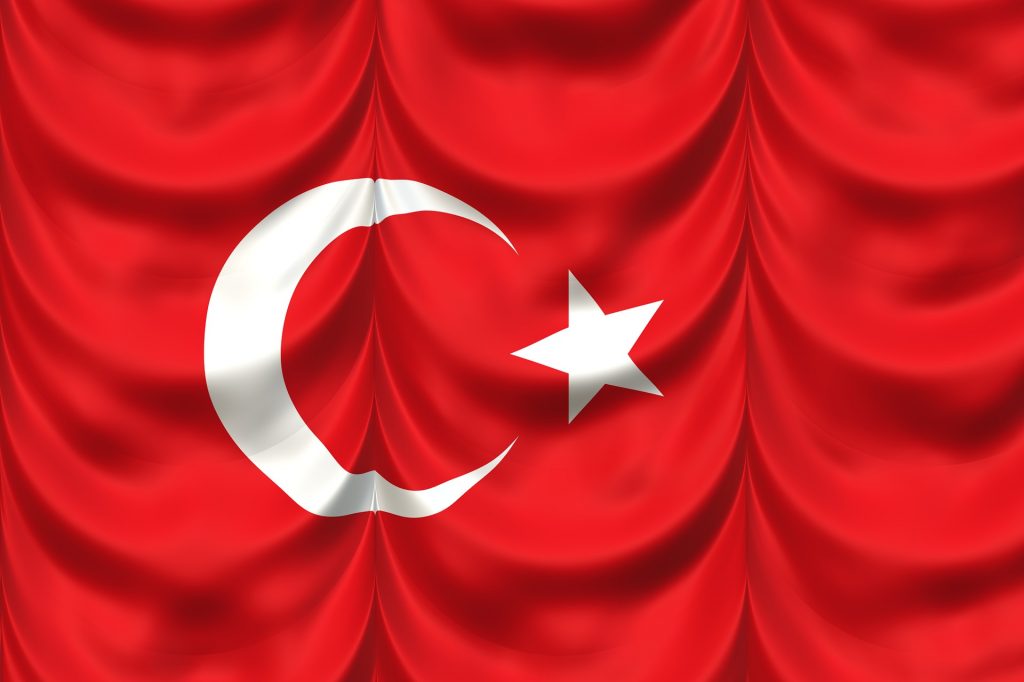
Turkish Days
On May 15-16th Turkish Days will take place at Kazimieras Simonavičius University. 3 lecturers from Adnan Menderes University (Aydin, Turkey) come to KSU to held 4 interesting and relevant lectures. Come and see!
May 15th, 14:20 – 15:50 (210 auditorium)
Alper YILMAZ, Adnan Menderes University
“Use of Propaganda in the world and in Turkish Political Life since 20.century till recent years”
The propaganda which aims to change the minds of people in a convincing way, has been a serious factor used by governments, political parties, non-governmental organizations and so many actors in order to reinforce their power. Since First World War until now, propaganda has evolved in a soft way, from militaristic methods seen such as in Nazi-party period by Hitler to technological and cultural methods, especially after the Cold War period under the leadership of the U.S. Soft power and public diplomacy methods has been frequently used in order to influence foreign public opinion and become dominant in the region, also Turkey gave importance to these methods. Consequently, this course designed to examine propaganda methods seen specifically in Turkish political life after II.World War until now. That’s why, it can be created an opportunity in order to make a comparison between propaganda methods in Turkey and Lithuania.
May 15th 16:05 – 17:35 (210 auditorium)
Ahmet AKBULUT, Adnan Menderes University
“What makes a leader effective?”
There are various types of leadership theories that determines effectiveness of leaders. One of them is “trait theories” which emphasize the traits or qualities of leaders, which lead to their ability their effectiveness. The “behavioural theories” sought to identify the specific behaviours of leaders that lead to their leadership success. The other one is “contingency theories” that states effectiveness of leadership is related to the interplay of a leader’s traits, behaviours and other situational factors. Moreover, the charismatic leadership is the guidance provided to an organization by one or more individuals seen as heroic or inspiring and who have therefore been granted the organizational power to make dramatic changes and extract extraordinary performance levels from its staff.
The other theory is “transactional leadership theory” bases leadership on a system of rewards and punishments that are contingent upon the performance of the followers. In addition to that, transformational leadership that a process where “leaders and their followers raise one another to higher levels of morality and motivation.” In this study, I will be mention about all these theories in order to show how a leader should be control and persuade the groups and society.
May 16th, 17:40 – 19:00 (210 auditorium)
Dr. Ali Erdem AKGÜL, Adnan Menderes University
Topics:
Dr. Ali Erdem Akgül specialty areas in academic life are: “Popular culture and media”, “Citizen-State Relation”, “Surveillance, Trust and Internet” and “Social-Political Movements and Social Media”.
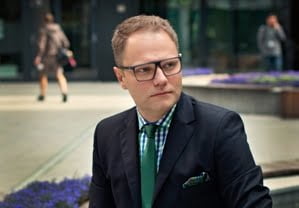
Dr. Marcin Białecki
May 18th 5.40 p.m. Dr. Marcin Białecki from Cardinal Stefan Wyszyński University (Warsow, Poland) will held a lecture at Kazimieras Simonavičius university.
The topic of the lecture is “Mediation in civil cases concerning The Hague Convention on Civil Aspects of Child Abduction. Recent developments in Polish Civil Procedure from theoretical and practical perspective”.
The aim of this mobility is to provide an analysis of the institution of mediation as an alternative means of resolving disputes under Polish civil procedure. The hypothesis Dr. Marcin Białecki has adopted not only focuses on particular provisions of the Code of Civil Procedure and other legislation concerning mediation, but concentrates first and foremost on the function of the solutions put in place and their usefulness, applying basic research methods, namely, legal dogmatism and comparative analysis.

Kazimieras Simonavičius University
On the 25th of April, the agreement on institutional cooperation among Kazimieras Simonavičius University (KSU, Lithuania), University of Nicosia (UNIC, Cyprus) and Yaroslav Mudryi National Law University (NLU, Ukraine) within the framework of master programmes was signed. Students of these universities will be able to gain Master degree from three Universities within 2 years study period.
Yaroslav Mudryi National Law University was established in 19th century and is a leading university in Ukraine in the field of Law. It has more than 23 thousands of students.
University of Nicosia is the biggest university in Cyprus and has more than 11 thousands of students from over than 70 countries. School of Law of University of Nicosia has more than 20 years of experience in the provision of a top-tier legal education.
According to the signed agreement, universities will cooperate leading to the following post-graduate degrees: an MA degree in Law and Politics in the European Union (UNic), LL.M. in European Union Law and Global Challenges (KSU) and a Master degree in International Public Law (NLU).
1 study – 3 diplomas
The students of KSU’ LL.M. European Union Law and Global Challenges study programme have the possibility to be awarded Master degree from three Universities within 2 years:
Students of KSU LL.M. European Union Law and Global Challenges study programme may choose to study:
Students have to study at least one semester at the universities they choose.
Please, note that University of Nicosia provides online studies so students do not have to go to Cyprus to study and may stay in their homeland country.
International study model – unique and flexible
KSU Law faculty’s dean dr. Aida Kišūnaitė says “For lawyers it is very important to have a wide network of contacts. This international study programme allows to expand students network in three countries! It increases employment possibilities in the international context.
It is also important to notice that this study programme is very flexible: the student is free to choose not only the partners’ university and semester in which he/she wants to study there, but also the study subjects.
This integrated study model is very convenient from time and financial perspectives: instead of three different studies, which would last for 6 years, a student studies only 2 years. It also widens the horizons of knowledge because three different Law study programmes are integrated. Upon the completion of the studies, the student is awarded three separate diplomas from each partner university”.
Duration: 2 years (1,5 years for those who choose to study only at KSU or at KSU and the University of Nicosia).
Language: English
Degrees: Master in Law (Kazimieras Simonavičius University), Master in Law and Politics in EU (University of Nicosia) and Master in International Public Law (Yaroslav Mudryi National Law University)
For more information please contact: dr. Aida Kišūnaitė (e-mail: aida.kisunaite@ksu.lt, tel. nr. +370 5 213 5172).
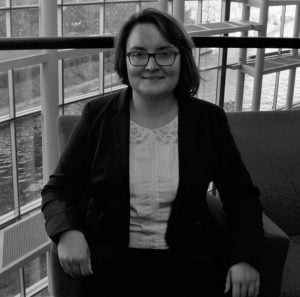 On April 12th 14.20 p.m. lecturer Katarzyna Kamińska from Kujawy and Pomorze University (Bydgoszcz, Poland) will held a lecture at Kazimieras Simonavičius University (212 auditorium). The topic of the lecture is “Social market economy as a model for economic order in the EU”.
On April 12th 14.20 p.m. lecturer Katarzyna Kamińska from Kujawy and Pomorze University (Bydgoszcz, Poland) will held a lecture at Kazimieras Simonavičius University (212 auditorium). The topic of the lecture is “Social market economy as a model for economic order in the EU”.
The lecture deals with the concept and the German model of the social market economy and its importance as a model for shaping the economic order of the European Union. The lecture focuses on three main issues: the problem of the definition of a social market economy, the discussion of ordoliberal theory as its theoretical background, and the implementation of this concept in the European Union. The aim of the lecture is to determine the influence of theoretical foundations of the model of a social market economy on the development of the European Union and its selected institutions.
We kindly invite you to participate! The lecture is open for all students.
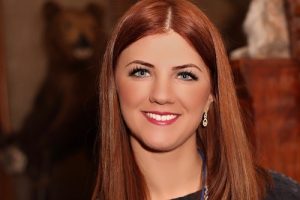
Alisa Salkič
On March 29th 2 p.m. prof. Alisa Salkič from International University Travnik (Bosnia and Herzegovina) will held a lecture on Constitutional Law and Comperative Law at Kazimieras Simonavičius University (Darius ir Girėnas st. 21, Vilnius, 214 auditorium).
The lecture will cover the topics of Constitution and Constitutionalism, Courts and Constitutions, Separation of Power and Governance, Personnel Freedoms, Social Welfare Rights, Centralization and Federalism, Privacy, Economic Rights, Due Process, Democracy Guarantees, etc.
The lecture is open. Everyone who is interested may participate.
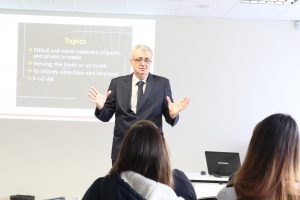
Assoc. Prof. Dr. Sabahudin Hadžialić
Assoc. Prof. Dr. Sabahudin Hadžialić is a professor at the Faculty of Media and Communications of International University Travnik (IUT). In the framework of the Erasmus + mobility, professor held a series of lectures on intercultural communication at KSU. Our conversation spins about communication, different cultures and countries.
What role does the communication itself play in a modern world?
Some politicians, economists and media people would like to say that their profession is the best in the world. What they say is the most common thing and everybody should obey that. The thing is that they forget interdisciplinarity of the meaning. It means that all of them should interact. That is a communication form. Communication means interaction. Interaction means understanding. Understanding means consensualism and consensualism means peace.
How did you take an interest in the intercultural communication?
Intercultural communication is a prerogative. Prerogative that means assumption of precondition of everything. To understand each other, first we have to communicate. Especially if we deal with foreign people, we have to know what intercultural means. Intercultural means that my freedom to communicate will stop on a point when my freedom hurts somebody else. Intercultural communication is a precondition for everything.
What are the most important things we should know when working with people from different culture?
First, we have to ask ourselves some questions like what I would like to accept from them and what I do not want to accept. The future is in mutual understanding, finding consensual formula that we are all humans and we are all red under our skin. I usually say that nation is a part of the history. We just need to wait for the end of the history.
How cultures are divided? Could you give us an example?
There are 10 different points for that: social background, culture, education, tradition, religion, population issue, gender issue, stereotypes, even ecology etc. There is nothing better than differences in the cultures. It unifies us. You and people from other culture may disagree about something. However, when you go back and think about it, you might find some their ideas that might be interesting and they may rethink of something yours. For example, I did my homework and I found the information that people of Lithuania are the less empathic people in the world. It was a research done. However, I found all the people that I met here to be more than that! They are so friendly and open.
Culture itself is a precondition for everything in the society. Do you know that 10 percent of earnings got from bread sales in Sweden are invested into culture? Swedish know that people with developed cultural and media literacy will be developed in a sense of better human beings and they will interact with others. That is the future. That is why I always say that religion must be love within the culture. By that, we will approve ourselves and have interdisciplinary approach.
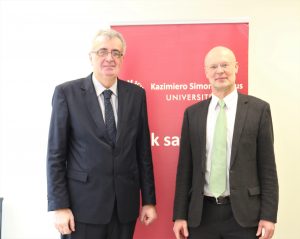
Assoc. Prof. Dr. Sabahudin Hadžialić and KSU Rector Prof. Dr. Arūnas Augustinaitis
Do you have any insights about Lithuanian culture during your visit here?
Yes, it is not my first visit here. When talking with students, I found out that you are so open. I did some research on the streets. I knew some things but I asked if passers-by could help me. Everybody was so helpful and very open! If you said “ačiū” in my country, I would say “bless you”, but in your country it means “thank you”. Those differences between cultures are so inspiring!
Do notice any differences or similarities between people in Lithuania and Bosnia and Hercegovina?
First, I would say that differences by the area does not exist. Despite the fact that we are in the south and have high mountains. You are high on the earth but you are not on the high level above the sea. For example, Sarajevo is about 700 meters above the sea level. It is general in Bosnia, except south part Hercegovina. People in Bosnia and Hercegovina eat less meat than you here. These are just the small differences. Despite that, we are all the same and we are all humans.
The differences between cultures for me are the advantages.
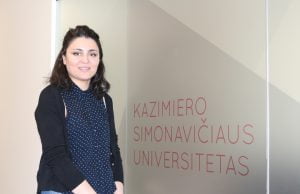
Rusudan Chachanidze
This semester Rusudan Chachanidze who teaches Strategic Management and Financial and Management Accounting at Caucasus University and University of Georgia, is a guest lecturer at Kazimieras Simonavičius University. We talk about the role of Strategic Management in a modern world, the education of Georgia and her impression on Vilnius and KSU.
How did you take an interest in strategic management?
Strategic Management is kind of a subject that has no special faculty for it. Therefore, it takes a lot of different knowledge to combine somehow. Firstly, on my BBA, I used to study marketing, then I switched to Finance and my PhD I am doing is on financial frauds. I had all general knowledge that helped me to go to the strategic management. It requires some knowledge of management, finance and marketing so that is why I decided to combine everything.
Why strategic management is important in a modern world?
Environment is very dynamic right now. Businesses and industries move very fast and change very fast so if you do not have proper tools to plan well, it is very hard to succeed. Although it does not work like you make a plan and it prevents you from changes. Furthermore, strategic management is more focused on being flexible and quickly respond to changes. I think it is a very important skill for each student who will go for having their own businesses or working in a big corporation. This planning skill, having this conceptual view and seeing things in a big picture is a very important capability if you want to succeed in business.
Is strategic management just about business or also public sector?
It is very relevant to both public sector and non-profit sector, so it is not only for businesses. Of course, planning is for everyone and it does not matter what you do, you need to plan things properly.
Do you have any insights about strategic management appliance in Europe and Georgia? Do businesses and governments understand the importance of it?
I think mostly big corporations do that. Every big corporation has its strategic management team and proper planning. Small corporations sometimes do not understand the importance of it. I try to bring to small companies and entrepreneurs the idea that it is important to have strategy even if you are small. I work with cases and I show how each of the theory that I’m teaching them is applied, I show the real life examples of big and small companies and start-ups, so they could see how useful it can be and how these tools are used to actually succeed.
Could you tell us more about Georgia education system? What role do the private universities play in Georgia?
In Georgia, we have many private and public universities. Before the reform, which was started I think in 2005 or 2006, government funding would only go to the public universities. Study quality at public university was not very high but private universities were good. Somehow, the government wanted public universities to keep up with the private ones. Therefore, government started this reform to create intense competition among public and private universities.
The voucher system was introduced. That means that money is given only to a student now. Public universities do not get any funding from government unless they attract students. If public university offers low quality education, students do not go there because they can bring their vouchers and money to private universities. In my opinion that helped a bit. Now we have at least one big public university, which has high quality education. And it is because of the competition. It’s all about student now.
In Lithuania the system is very similar. The difference is just mostly you can bring that public money only to a public university.
Well, it is the most important difference! Public universities has actually compete for money. They had to focus on quality, not only on number of articles or number of professors. Students do not care about that. All they want is to get a proper education and then find a job. Number of articles will not find you a job. That is why they have to increase the quality of education.
Tell us more about the University you came from.
Caucasus University is the university where I started my BBA (Bachelor of Business Administration); actually, this is my home university. It was one of the first private universities in Georgia, which had a very high quality studies and still has a very good reputation. It is a small university. Ant the other one is one of the biggest private universities in Georgia. They both are private and very successful. For example, Caucasus University still has a reputation that graduates of it can overcome any challenge. It is because it was very difficult to study there. I think time that I spent there has really helped me get more confidence and believe in myself, just believe that I can do anything I want. If you can survive 4 years there, you can survive anything! (Laughing)
What about students here in Lithuania and in Georgia? Do you notice any difference between Lithuanian and Georgian students?
Actually, no. Students have the same values and they are friendly. I like your students because they are so welcoming, friendly and very smart students as well. Sometimes after lectures, they invite me to hang out with them and just to be a part of their lives. They took me to the places where they usually go. And I really like being with them! It helps to know the culture better because when you come to a country just for two weeks and you do not have any friends here it is not easy to get into the culture. However, if you have someone who just take you to the places where they go and you get involved in their everyday life you understand the culture better. Everyone is very friendly here!
What is your impression about KSU?
Oh, I like your university very much! First time I visited it last year in summer on a workshop. I liked it so much! Well, I also liked the city. It was summer, sunny all the time. People I met from the administration were very nice. I was very glad to get this offer because I really wanted to come back here. It is so interesting to be here. Now you have this new building and you are growing so I am very glad to see your success.
Will you come back soon here in KSU?
I really hope that. I would like to have a chance to come back here!
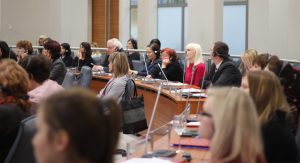
On December 1st the international workshop “Achieving Progress in Children’s Welfare: Interdisciplinary and Multilevel Governance Perspectives” took place at Vilnius City Municipality. The workshop was organized by Kazimieras Simonavičius University Interdisciplinary Research Centre for Children Rights and Children’s day centre “Navininkai”.
This workshop aimed to address the question of an interdisciplinary approach in children’s rights related policies and their implementation in order to promote the idea and the role of inter-institutional cooperation for children’s welfare at all levels of governance.
More than 100 specialists from various public institutions and NGOs participated in the workshop. The presentations were made by Ombudsperson for Children’s Rights of the Republic of Lithuania Dr. Edita Žiobienė and 12 scholars and practitioners from Lithuania and foreign countries:
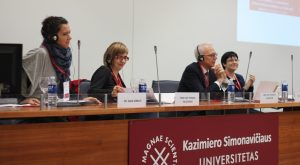
Presenting the Interdisciplinary Research Centre for Children Rights which was established on July, Dr. Aida Kišūnaitė said: “It is important for us, scholars of Interdisciplinary Research Centre for Children Rights, to be heard by legislature and executive institutions because we seek to encourage the complex attitude to children’s rights not only between the members of scholar’s community but also to foster forming researched based politics in the field of children’s rights. The main goal of the international workshop is to attract the attention of society and practitioners towards the implementation of interdisciplinary approach in the field of children’s welfare and to encourage the cooperation between the separate sectors such as social, health, education and legal”.
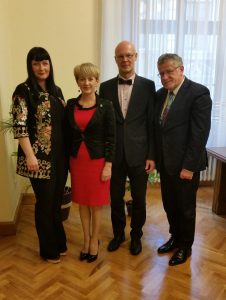
Prof. dr hab. Monika Jaworska-Witkowska, Dean of Faculty of Social Sciences, Kujawsko-Pomorska Szkola Wyższa in Bydgoszcz, Iwona Waszkiewicz , Deputy Mayor of Bydgoszcz, prof. dr. Arūnas Augustinaitis, KSU Rector, and prof. dr hab. Lech Witkowski.
On October 27-28th Kazimieras Simonavičius University (KSU) Rector prof. dr. Arūnas Augustinaitis participated in the International Interdisciplinary Conference “One World – Many Cultures“ which took place in Bydgoszcz, Poland. The 7th international conference is organized by Kujawy and Pomorze University in Bydgoszcz.
On the first day of the conference KSU Rector prof. dr. Arūnas Augustinaitis shared his experience and talked about Management and Ethics of Private University in a Changing Europe.
KSU together with Kujawy and Pomerania University in Bydgoszcz (Poland), the Kyrgyz National University (Kyrgyzstan) and Romanian University of Sibiu signed the quadripartite cooperation agreement to share didactic experiences, to cooperate in business, culture and sports, to raise quality and efficiency of studies, to strengthen the competitiveness of universities and ensure the interaction of education, business and innovation.
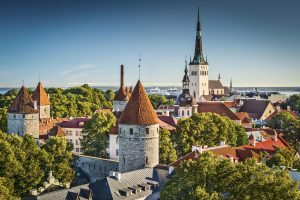
Director of Creative Society and Economy Institute assoc. prof. dr. Remigijus Venckus will visit the Estonian Academy of Arts on September 26-30. The visit marks the beginning of cooperation between Kazimieras Simonavičius University and Estonian Academy of Arts.
Director will meet the Tallinn Art Academy senior researcher assoc. prof. dr. Raivo Kelomees on September 28th.
According to assoc. prof. dr. R. Venckus, dr. Raivo Kelomees is one of the most famous contemporary media art explorers in Estonia, he has also engaged in the practice of video art and has been invited to many universities as a lecturer. We hope that in the future assoc. prof. dr. R. Kelomees will visit Kazimieras Simonavičius University too.